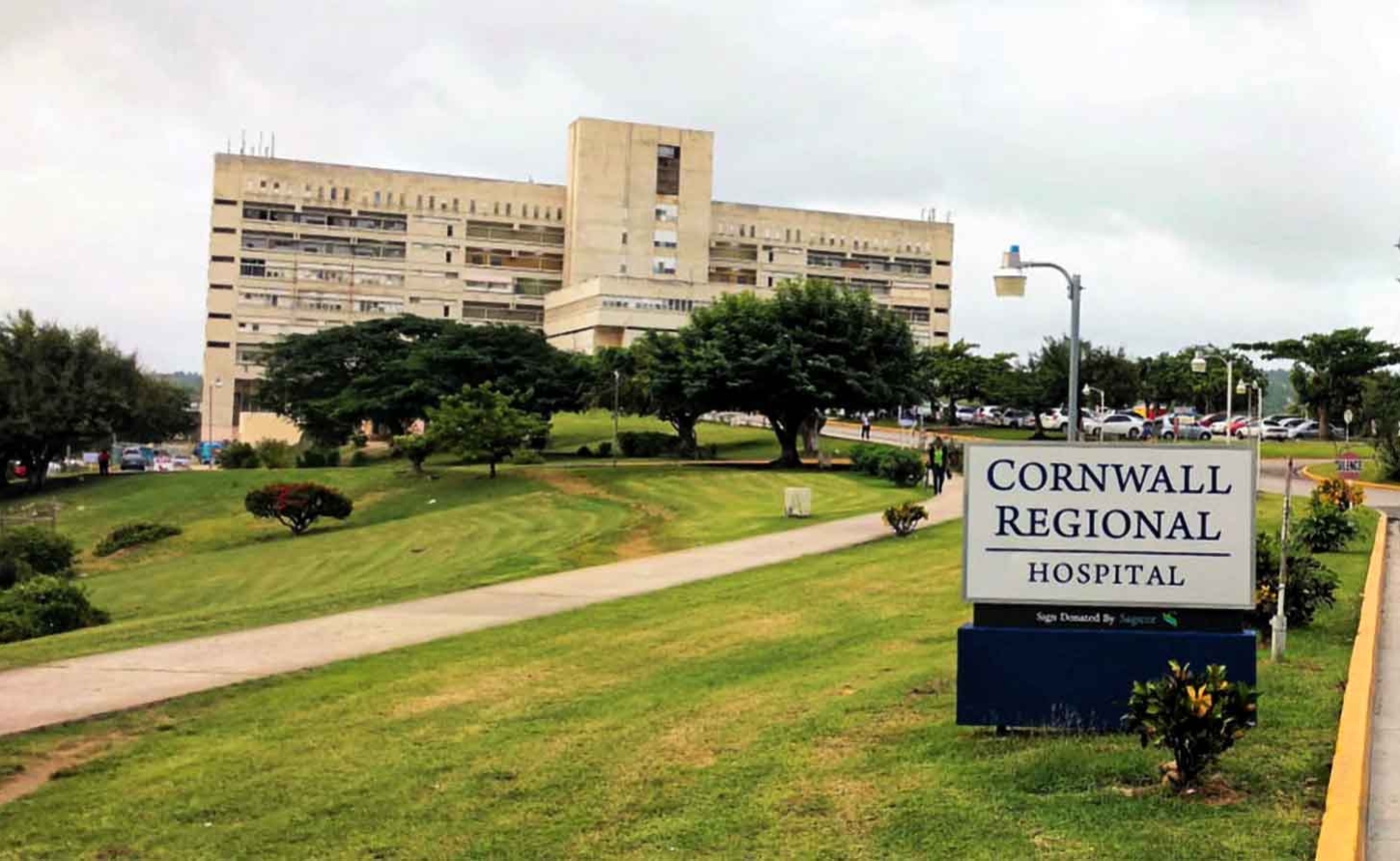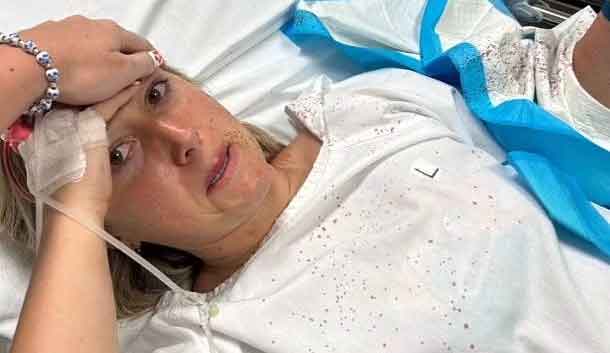JAMAICA | When Healthcare Fails: The Cornwall Regional Hospital Fiasco and Its Deadly Ripple Effects

MONTEGO BAY, Jamaica, May 27, 2025 - The Cornwall Regional Hospital's seemingly endless renovation saga has become more than just a bureaucratic embarrassment; it's now a life-threatening crisis that's reverberating far beyond Jamaica's shores.
When 26-year-old British pharmacologist Rachel Smith was mauled by a reef shark off Rose Hall Beach in Montego Bay on May 8, her ordeal exposed the devastating consequences of Jamaica's crippled healthcare system in brutal, blood-soaked detail.
Smith's ring finger was left hanging by threads as blood poured from the savage wound, but the real horror began when she reached the hospital. The private facility demanded $2,000 upfront just to dress her wounds and quoted $25,000 for surgery—all while prioritizing payment over stopping the bleeding.
With no plastic surgeon available for two weeks, Smith was forced to abandon her vacation and fly to Ireland for emergency treatment, where doctors discovered ruptured tendons, nerves, and ligaments that could have been addressed immediately with proper care.

The project, initially budgeted at just over $5 billion, has now reached a staggering $21.4 billion according to government budget documents, with the final cost expected to hit $23.5 billion.
The numbers tell a story of breathtaking incompetence. What was supposed to be completed by September 2018 has been pushed back repeatedly, with the latest target now set for March 2025—if that deadline holds. Meanwhile, Western Jamaica—home to the island's tourism crown jewel, Montego Bay—has been left without its primary healthcare facility for nearly a decade.
Senator Janice Allen of the opposition People's National Party minced no words in her assessment: "After eight years and a cost jump from $2 billion to [$23] billion, what the people of western Jamaica deserve is healthcare, not headlines. The opening of an administrative wing does nothing to restore the critical services patients have been waiting for, for years."

The advisory pointedly notes that "private hospitals require payment up front before admitting patients and may not have the ability to provide specialized care"—exactly the situation Smith encountered.
The U.S. travel warning represents an unprecedented rebuke based partially on healthcare inadequacies, something that should send shockwaves through Jamaica's tourism-dependent economy. Jamaica welcomed approximately 4.3 million visitors in 2024, generating over $4 billion in tourism revenue, making American confidence in the island's safety infrastructure crucial to economic survival.
“ A nearly decade-long hospital renovation has ballooned from $2 billion to $23.5 billion while leaving Western Jamaica's medical infrastructure in shambles ”
The Cornwall Regional Hospital debacle began simply enough. In 2016 and 2017, patients and staff reported noxious fumes, leading to the relocation of critical services including the intensive care unit and operating theaters. What should have been a straightforward remediation project quickly revealed the hospital's underlying structural decay.
As Prime Minister Andrew Holness later admitted, "When you actually start to strip the building and you begin to see all the cracks, the concrete that is crumbling, all the steel that is rotting, all the issues, what you initially budgeted may not be what the final cost is".
The irony cuts particularly deep when juxtaposed against another medical facility rising simultaneously on the same compound. The Western Children and Adolescent Hospital, a vision originally championed by former Prime Minister Portia Simpson Miller, tells a starkly different story of competent project management.
Launched in 2017 and nearing completion with structural works for the main building, nurses' residence, and morgue already finished, this 220-bed facility has stayed largely on schedule and within reasonable budgetary parameters. With $800 million allocated for 2025 to complete cladding and procure equipment, the hospital will be "the first of its kind in the English-speaking Caribbean" for pediatric and adolescent care.
The contrast is devastating: while one hospital project spirals into a $23.5 billion catastrophe spanning nearly a decade, another proceeds smoothly toward completion on the same grounds. It begs the uncomfortable question of whether the Cornwall Regional Hospital's woes stem from incompetence, corruption, or a toxic combination of both.
The project has been plagued by contractor changes, bureaucratic delays, and what critics describe as cavalier spending. The controversial $15-billion contract awarded to Chinese firm ZDA Construction Limited was criticized by the Public Procurement Commission as "irregular," though the Ministry of Health rejected this assertion. The Jamaica Institution of Engineers slammed the project as "a messy, messy project" with "all the hallmarks of bad planning."
Meanwhile, the human cost mounts. Smith's sister Lisa, who witnessed the shark attack, remains traumatized. "I honestly thought her fingers were gone—there was blood everywhere," she recalled. "At one point a vein burst and sprayed blood all over both of us. We were just crying and thinking she was going to die."
The shark attack itself might have been a freak occurrence—only three unprovoked shark attacks have been reported in Jamaica since 1749, according to the International Shark Attack File—but the medical response was entirely predictable given the state of Jamaica's healthcare infrastructure. Smith's experience of being treated as a cash cow rather than an emergency patient reflects a system where profit precedes patient care.

Health Minister Christopher Tufton recently celebrated the reopening of Cornwall Regional's administrative block, calling it "the first milestone" and describing the "nerve of the facility" as "really, really looking good". But administrative offices don't perform surgery, and press releases don't stop hemorrhaging—literal or metaphorical.
The minister's optimism rings hollow when taxpayers can witness firsthand what competent hospital construction looks like just yards away from his much-vaunted administrative wing.
The Cornwall Regional Hospital saga has become a perfect metaphor for governance failure: a project that began with the best intentions, spiraled out of control through incompetence and mismanagement, and now threatens the very industry it was meant to protect.
Smith survived her ordeal, but her experience serves as a bloody warning of what happens when healthcare systems collapse and bureaucrats prioritize ribbon cuttings over real care.
As Smith recovers in Ireland, hoping to regain full use of her hand within 18 months, her story should haunt Jamaica's leadership. She was lucky enough to have family in Ireland and the means to flee for proper treatment. The next tourist might not be so fortunate—and Jamaica's reputation might not survive another such debacle.
The question isn't whether Jamaica can afford to fix its healthcare crisis; it's whether the country can afford not to. With billions already wasted and lives hanging in the balance, the Cornwall Regional Hospital project has become more than just a construction nightmare—it's a test of whether Jamaica's government can deliver basic services before tourism dollars dry up and international confidence evaporates completely.
-30-
